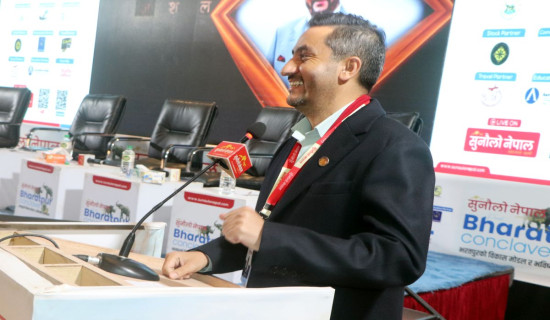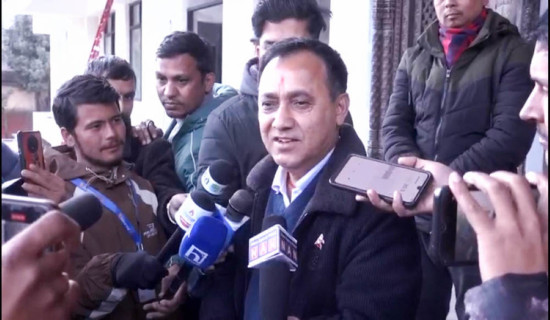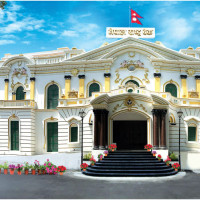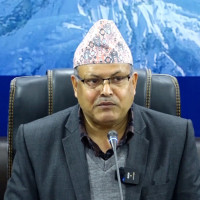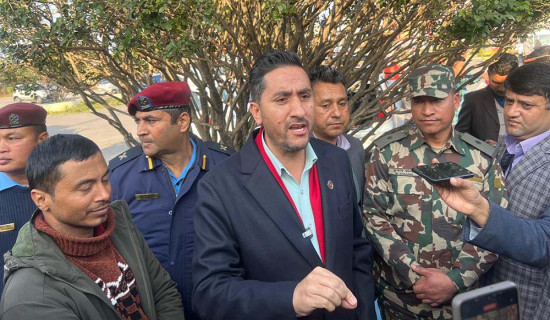- Saturday, 3 January 2026
Dashain Special
Dashain Nostalgia
How many of you have the memory of the days when people wrote letters to each other? I personally have a vivid memory of the times when people sent letters to give important messages. In the case of our family, usually a letter would announce the prospect of an exciting or a dull Dashain we would have.
“I will come home for Dashain tika,” our second-eldest brother would write. “I hope the eldest brother will join too.” Or he would write, "Sorry, mom and dad, I won’t be able to come home this Dashain. I have been tied with some urgent assignments. So mark the festival well. I promise, I won’t miss next time.”
I’m talking about the days in the late 1970s when we didn’t have easy access to a telephone in the eastern hills of Khotang, let alone the ubiquitous smart phones with Messenger or WhatsApp. Letter used to be the only easy and cheap medium of communication. When I was a young boy of eight or nine, two of our elder brothers were out of home for employment while two of us lived with the elderly parents. Our only sister, the seniormost of us all, had already been married off to a village some distance away, and she had her own family to attend to.
Whenever we got the letter with a message that the brothers would come home for Dashain, our happiness knew no bounds. We felt happy because that meant my elder brother and I would have new dresses for Dashain, as would our parents. No wonder, Dashain was the only time we used to get new clothes. Often, they would serve as our school dress, and we were supposed to use them with caution so that they lasted for a year. The brothers would also bring various spices required for mutton kabaf/pakku, sugar, which was an equally treasured commodity in those days, and mustard oil too.
As the festival approached, we had our own share of tasks at home—to paint our house with yellow clay and red ochre, make arrangements for bitten rice and bananas, or buy them from the local market. We would arrange for local cucumbers and guavas for our brothers, who would usually leave in a week’s time. We used to have the mandatory he-goat mostly grown at our own home. And then we—all four of us—would begin counting the days our brothers would arrive home. When they did, there would invariably be a ritual of showing and observing the items they had brought a day after they arrived.
A student visitor
And in the year 1984, after completing 7th grade in the local school, I moved to Biratnagar for high school with my second-eldest brother. Then I would eagerly wait for Dashain holidays to visit my home. Our eldest brother would join us from Beltar, Udayapur. Besides, there would be several other villagers together with us, almost like a caravan. It was up to us to carry the clothes for the parents and other family members and the other items essential for the festival. Obviously, it took more than a day’s arduous walk to reach home, and there were no hotels on the way. We had to find a place to stay overnight and prepare food on our own. But the physical hardship didn’t matter much in consideration of the family reunion and the joy we would have together. We would get the updates of the entire village—who passed away, who got married, who fell ill, or even who fought over minor differences and were no more on speaking terms.
This continued for about six or seven years. Meanwhile, my second-eldest brother got married. Then we moved to Kathmandu, where I began teaching in private schools. As the second-eldest brother had his own family now, often I was the only one to go home during Dashain from Kathmandu, with the eldest brother joining me from time to time. It was quite an ordeal to get a ticket and travel by night bus, but I had to do it anyway because our parents were getting older and they expected us, at least me if not the ones with their own families, to be there on the day of Bijaya Dashami. They also wished me to get settled (read married), so I found a girl and tied the nuptial knot. And in 2002, we lost our mother to cardiovascular complications at a not-so-advanced age of 75, followed by our father just 18 days later.
No centre to hold
Dashain was never the same since we lost our parents. That annual ritual of visiting the birthplace to receive the tika and blessings from our seniors came to an abrupt end. If we felt like, we could always go to Beltar at our eldest brother’s place. He is a generous man who welcomes one and all with an open heart. He makes everyone feel special and tries his best to make sure we feel at ease. So does our eldest sister-in-law. So my wife and our only daughter feel completely at home in Beltar. Now we reside in Bhaisepati, Lalitpur, but they are always ready to visit whenever time favours us.
But despite all the hospitality of my eldest brother and the family, I always missed the Dashain vibes we used to have in Khotang when we had the good fortune to celebrate the festival with our parents and receive the tika and blessings from them. I miss the letter my second-eldest brother would send us. I miss the hustle and bustle of getting the good-quality clay to shine our mud-and-stone house. I miss the excitement of checking what our brothers had brought for us. I miss the arduous walk home with a heavy backpack stuffed with all those dresses and other items for my elderly parents and the family of my elder brother. I miss the good feeling of home-bound caravan and the peasant talks we used to have on our way home. I miss the taste of fresh mountain cucumber and the ripe guavas we savoured during our short visits to our native village. I miss the pleasure of going up a swing. I miss the conversation I used to have with my dear mom and dad and all those gossips about the villagers.
“Hello Ramesh, how do you do?” I got a call from my second-eldest brother a fortnight ago. “We are flying to Australia tomorrow for a month. You and the family mark the Dashain well.” They were heading to the land of kangaroos to celebrate Dashain with one of the two daughters and a son in Melbourne.
Unlike in my childhood days, I was not very upset by the message. Nor was I very glad for them, who would make the best of their time together after many years. As I got older, I gradually lost that sense of pleasure and fun I used to have as a child in whatever came my way. I don’t feel joy even when I behold a rainbow in the sky. Perhaps you don’t either. What makes us so weary and indifferent?
I am materially far-off compared to our socio-economic status in the 1970s or 1980s, but somehow I have a feeling that I am poorer now. I can buy anything I want, but I don’t have the energy or excitement to go buy it. I feel that the sanctity of Dashain has been swamped in the all-consuming sweep of materialism. Even the kids seem to think of it from a materialistic point of view. Obviously, what they want is new dresses and the money. Over the decades, Dashain seems to have been divested of its cultural and religious significance, deep human connections and family values it entailed, and the social and natural ambience it brimmed with. I wish I could travel back to the time when I was a young boy and waited eagerly for the pastoral Dashain we used to have at our birthplace.
(The author is Deputy Executive Editor of this daily.)



